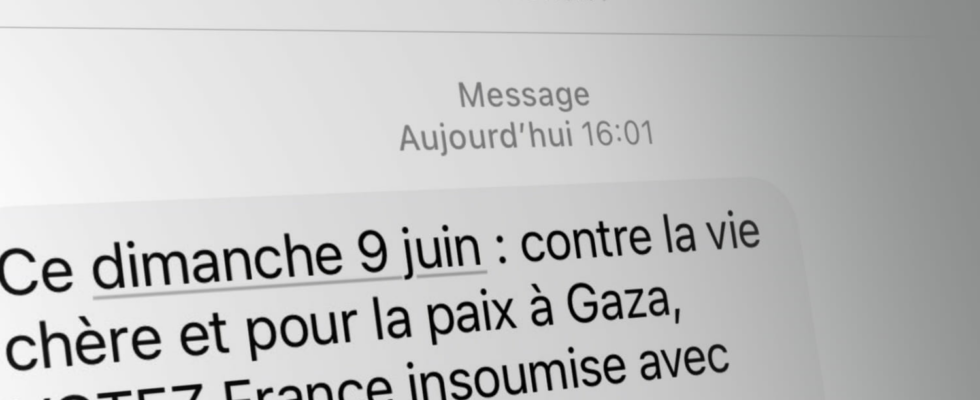Several candidates in the European elections sent text messages calling to vote for them. An annoying approach, which does not fail to raise questions. How did the parties obtain the phone numbers and is it legal?
Only a few days left before voting for the European elections, which will take place on June 9! As the electoral truce is about to begin, many French people have received SMS messages from certain candidates calling to vote for them, as witnessed by many Internet users on X (formerly Twitter). “Hello, it’s Marion Maréchal. On Sunday, vote to stop immigration, insecurity, welfare and tax hell. My video here.” “This Sunday, June 9: against the high cost of living and for peace in Gaza, VOTE France insoumise with Mr. Aubry and JL Mélenchon Share!”
Here are some of the funny messages received by voters in recent days. But Reconquête and La France insoumise are not the only ones to have engaged in this intrusive canvassing. SMS messages from Raphaël Glucksmann and Marie Toussaint were noted, as noted West France. A practice which has already been observed during previous elections, but which, as always, does not fail to annoy the recipients. The same questions come up every time: how did they get their phone number? And is the process legal?
SMS from election candidates: a method that is not new
The National Commission for Information Technology and Liberties (CNIL) explains that there are generally two ways in which telephone numbers are obtained by political parties: either the person has indicated their telephone number directly on their form, or they passed its details to a private company, and these were then purchased or rented by the parties in question. The latter then ask the private company to target a specific audience – age, gender or specific area based on previous electoral results –, in the manner of commercial prospecting.
Problem: going through a service provider in no way makes the SMS campaign legal, because “the terms of the initial collection are not necessarily known to the party or candidate who reuses them or even adapted to political prospecting”explains the CNIL on his website. Understand: if these campaigns can indeed be legal, it is sometimes complicated for political parties to ensure that all of the people targeted by SMS have indeed given their consent to be contacted for political prospecting purposes. Which explains the annoyed reactions of certain Internet users, to say the least…
Near BFMTVLFI ensures that this SMS “was sent to voters attached to polling stations who largely voted for Jean-Luc Mélenchon during the last presidential election to maximize participation. This sending was carried out by a service provider, in strict compliance with the rules of the CNIL and the GDPR”.
For its part, Reconquest explains that “the contact details of the recipients of our communication come from an opt-in database” – a statement which certifies that the person has given their consent to receive advertisements, by accepting that their telephone number is used for advertising purposes and authorizing the transmission of this data to partners for example – provided by the company Selfcontact .
Please note that everyone is free to contact the latter to ask for the origin of the data concerning them and how it was collected, in particular througha form available on its site. To no longer receive this type of message, it is best to reply “STOP” by SMS.
